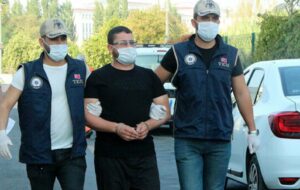Abdullah Bozkurt/Stockholm
The criminal justice system in Turkey, under strict control of the Islamist government, has systematically failed to stem activities of militants who have been providing logistics for the Islamic State in Iraq and Syria (ISIS) terrorist network in Turkey’s borderland areas with Syria.
Feyzullah Yeşildeniz, 23-year-old ISIS terrorist, provided safe houses for foreign jihadists who moved out of Syria, where they faced increased pressure from both the US-led anti-ISIS coalition as well as Russian aerial assaults. Although his activities were well known to authorities and the evidence in the criminal case including witness statements verified his links to ISIS, he was released by the court in April 2019. He was among three people who were under arrest pending trial, and the panel of judges ruled to let him and his associates — Süleyman Seginç and Yusuf Kırtay — go free.
As soon as he was freed, Yeşildeniz picked up from where he left off before his arrest and continued to provide services for ISIS members. He secured a safe house for 30-year-old jihadist Soumaya Raissi, a French national of Tunisian origin, who crossed into Turkey in the summer 2020 from Syria. The safe house, located on the first floor of an apartment building in Adana’s Namık Kemal neighborhood, was maintained by ISIS militants who provided food and supplies to Raissi, who never left the apartment for fear of attracting attention. She stayed in the apartment all the time with her small child.
Raissi was facing an outstanding arrest warrant issued by French authorities and disseminated through Interpol when she was detained on October 14, 2020 in Turkey’s southeastern province of Adana. Her first husband, Rached Raissi, was detained in Turkey’s Gaziantep province in 2016 and was later deported. Soumaya established a life for herself in ISIS territory and remarried an ISIS terrorist in Syria. Her brother-in-law is also an ISIS militant.

Yeşildeniz was embedded in an ISIS Turkish network run by Mahmut Özden, a senior Turkish jihadist who had been imprisoned some 10 times in Turkey, only to be released in all instances before he was last detained on August 20, 2020 and formally arrested on August 31. The police found an AK-47, a mixture of TNT and RDX explosives, communications with other ISIS cells in Iraq and Syria and ISIS propaganda materials during the raid on the suspects’ residences and workplaces. He will most likely go free again or receive a slap on the wrist in a criminal justice system that is permissive when it comes to cracking down on jihadist groups.
Similar lenient treatment for others was also observed. For instance, during his arraignment on October 19, 2020 Yeşildeniz claimed that he thought Soumaya was a Syrian refugee and was simply helping her find a place to stay. The search history on his mobile phone showed he looked up Interpol warrants, suggesting that he actually knew who Soumaya was.
Yet, the court ruled to release him pending trial just like he was released on two other occasions in the past. However, fearing possible trouble with the French government, which had started raising Turkey’s links to jihadist groups in Syria and Libya, the Erdoğan government signaled to judges hearing the ISIS trial involving both Özden and Yeşildeniz that they should remain in prison for the time being. The Turkish prosecutor appealed the release decision, and Yeşildeniz was arrested again.
Özden’s ISIS cell was looking for a window of opportunity to strike in Istanbul’s historic Taksim district, popular with domestic and foreign tourists. The cell tasked an ISIS militant named Hüseyin Sağır to scout the area. The encrypted communications found on Özden’s laptop, seized during the police raid and later decrypted by authorities, showed secret exchanges between Özden and other ISIS militants including Sağır. “We have been traveling around Taksim for 3 days. We’re right under their noses. We’ve put out the word for supplies in 10 places. Someone said, ‘I’ll find it [what you’re looking for].’ It feels like we’re close to the end,” an ISIS militant wrote to Özden.
ISIS members were concerned that authorities might track their digital footprint and took measures to cover their tracks.

“We’d like to see you after we’re done with this. Brother, make sure you take precautions. Destroying the mobile phone in your possession in advance would be good for the well-being of our other brothers,” Sağır wrote to an unidentified ISIS militant who appeared to be selected for a terrorist attack.
The street camera footage in Taksim showed that Sağır, accompanied by an unidentified woman, was moving around the Taksim district for what investigators believed was surveillance to identify a site for a possible terrorist attack. The police are reportedly looking for the woman who appeared in the footage.
Turkey observers have little faith in the country’s criminal justice system in cracking down on ISIS and other jihadist cells given the Islamist policies of the current Justice and Development Party (AKP) government, led by President Recep Tayyip Erdoğan.
Nordic Monitor has published multiple reports based on confidential documents and whistleblower accounts showing how Turkish intelligence worked closely with ISIS and al-Qaeda militants to promote the Erdoğan government’s political agenda.
For instance, the three high-profile ISIS militants suspected to have been deployed for a major attack on the French Embassy in Ankara had been caught at the border by the Turkish military and briefly detained but were let go pending trial by a court and are currently at large. Turkish intelligence and military officials had secret talks with ISIS on several occasions. Hundreds of ISIS militants have been freed from Turkish prisons in recent years, reflecting the permissive attitude of Turkish officials when it comes to jihadists.












